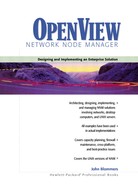Primary, Secondary, and Other Mysteries
With the emergence of BIND (Berkeley Internet Name Daemon) version 8, terms like primary server and secondary server are replaced by master server and slave server, respectively. The name of the configuration file /etc/named.boot is now /etc/named.conf and the syntax of the file is improved to be more flexible and more readable. There’s even a Perl script (named-bootconf.pl) to upgrade the configuration file syntax.
BIND version 8 is very desirable because of its many new and important features. It can check that names in the database or in replies conform with RFC 953. There is full control over message logging. An access list of allowed slave servers limits opportunities for crackers/hackers to attempt zone transfers. This also means you need to coordinate with the DNS support group if you want to run NNM as a secondary/slave DNS server. There is a synchronization feature to allow a master server to notify its slave servers of a database update. Dynamic updates are supported by allowing an authorized system to send an update message to the master server. This is especially useful in DHCP (Dynamic Host Configuration Protocol) environments.
